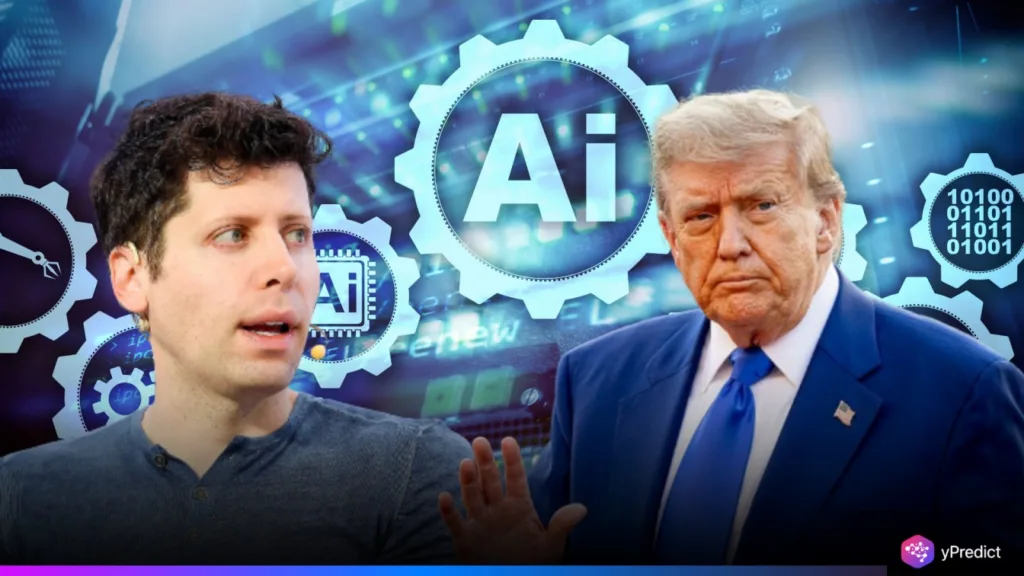
Sam Altman, CEO of OpenAI, recently praised former President Donald Trump’s grasp of artificial intelligence on the Hard Fork podcast. According to Altman, Trump “really gets it,” particularly AI’s economic value and geopolitical stakes. Altman highlighted regulatory improvements under Trump’s leadership, including streamlined permitting for data centers and energy projects crucial to AI growth. He suggested things “could have gone the other way,” crediting the administration for enabling U.S. infrastructure to keep pace with AI demand. The comments reflect Altman’s belief that sound public policy is critical in unlocking AI’s full potential and supporting domestic innovation.
OpenAI’s Government Engagement and Policy Strategy
The words of Altman were not made up out of thin air. His approach to the development of the technology has been extremely public and policy-oriented ever since his co-founding of OpenAI in 2015. The blistering success of OpenAI, which introduced ChatGPT to the world and then DALL-E, created a lot of buzz in the world, yet Altman has made it clear since the beginning that communication with governments is as essential as scientific achievements. He has met with world leaders, appeared before Congress, and attended global AI conferences. His plan is to be able to develop a regulating environment that is a mix of innovations and safety.
He believes AI isn’t just a commercial tool; it’s a geopolitical asset. Altman’s comment about Trump’s support for AI infrastructure ties into this, suggesting that regardless of political party, leaders who actively support AI development play a critical role. With AI now touching everything from national defense to energy, Altman sees collaboration between tech leaders and governments as not optional but essential. According to Altman, the decision by Trump to streamline the regulations of energy and data infrastructure preconditioned the outstanding moment of the AI boom in America today. This highlights the approach of OpenAI: it should be at the heart of both technological advancements and the policy debate to guide the effects of AI in society.
Infrastructure, Investment, and Leadership
Under Altman’s leadership, OpenAI has secured billions in funding, most notably a landmark partnership with Microsoft. But infrastructure, not just capital, has become central to the AI race. Modern AI tools require immense computing power, massive energy consumption, and reliable, scalable hardware. Altman’s praise for Trump’s deregulatory moves reflects this reality. Permits for data centers and clean energy projects directly affect how fast companies like OpenAI can grow. He framed it as a practical concern, not a partisan one: government policies that enable quicker builds and lower energy barriers directly accelerate AI deployment.
With rivals like China racing to develop their own AI stacks, Altman sees domestic infrastructure as a national priority. OpenAI’s strategy goes beyond building smarter models; it’s about building systems that can scale securely and responsibly. In that context, leadership matters. Altman has taken an unusually political role for a tech CEO, meeting with officials across the aisle and around the world. He believes that AI’s future hinges on shared responsibility, and that includes acknowledging when policymakers get it right. In this case, he said Trump did. Whether the public agrees or not, Altman’s comments reveal how AI infrastructure has become inseparable from politics.
AI’s Political Moment
As AI changes the industries and shifts global power structures, entrepreneurs become the de facto global power brokers, the likes of which were once limited to the world of diplomacy. The very fact that he is ready to give Trump the credit is something that is an infrequent occurrence in a space that continues to stagnate in terms of partisanship. The words of the proponent Altman are a reminder that the bright future of AI is not only about more efficient algorithms but also about regulatory clarity, partnership across industry, and infrastructure support. Regardless of whether one shares his politics, the message is obvious to Altman: the individuals who create AI policy today are going to make history tomorrow.






